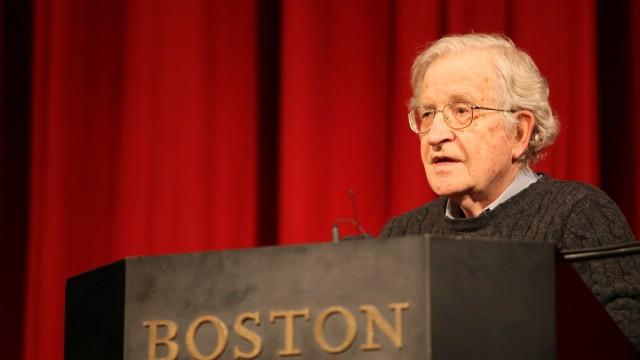The notion that journalists are the watchdogs of democracy is a standard that Noam Chomsky has lived by over the course of his career.
On Saturday, the “father of linguistics” spoke to a silent crowd in the Heights Room of Boston College’s Corcoran Commons.
Chomsky is an institute professor and professor of linguistics emeritus at the Massachusetts Institute of Technology. In addition to having built a career as a philosopher, scientist, activist, and commentator, Chomsky has authored over 100 books.
The recipient of the Sydney Peace Prize and several other awards, he presented a lecture titled “Freedom of the Press in the Middle East.” This talk was a part of the larger, day-long symposium co-sponsored by the Peace Islands Institute and the Islamic Civilization and Societies Program at BC.
“The situation is pretty awful,” Chomsky said, speaking about the Middle East.
“There’s no point talking about the press freedom in Saudi Arabia, so we won’t mention it.”
He explained that some countries have made significantly more progress than others have, highlighting Lebanon as one of the more developed nations in the area. The press in Saudi Arabia and Turkey, on the other hand, have not seen quite as much political independence.
“There’s no point talking about the press freedom in Saudi Arabia, so we won’t mention it,” Chomsky said.
He then turned the audience’s attention to Turkey, acknowledging the upcoming G20 Antalya summit that is taking place on Nov. 15.
This meeting will be the 10th annual conference of the G20 members, including Argentina, Australia, Brazil, Canada, China, France, Germany, India, Indonesia, Italy, Japan, Republic of Korea, Mexico, Russia, Saudi Arabia, South Africa, Turkey, the United Kingdom, and the United States. Due to the large participation in and significance of the meeting, Chomsky explained that journalists from all over the world will be flocking to Turkey to cover the event.
The issue lies in the fact that Turkish journalists have been barred from reporting on the summit, Chomsky said. This was an order from Turkish President Recep Tayyip Erdogan, and he said it exemplifies the control that the government has over the press in such parts of the Middle East.
Chomsky then went on to describe some of his own personal experiences with journalism in Turkey, saying he has witnessed the horrors of buried truths. In one of his stories, he described sitting in a courtroom while his friend, a publisher, was tried by the Turkish military.
“Turkey is the only country I know, today and back in the past, where prominent intellectuals not only protest the crimes of the state, but undertake civil disobedience against it,” Chomsky said. He then continued to express the great extent to which these writers and artists suffer for their attempts to attain justice.
After Chomsky finished speaking, the event was opened up for questions from the audience of BC students and faculty, as well as members of the greater community.
The first person stood up and inquired as to whether Chomsky believed the recent terrorist attacks in Paris will lead to fascism in Europe. Chomsky replied that ultimately, it is very possible. He also connected the event to another—the bombing of a Russian airliner in Egypt.
He explained that Russia, France, and the United States are the three countries that are currently fighting radical Islam, which is why it would make sense for Paris and Russia to both be targeted.
Another member of the audience asked what Chomsky thought the role of journalists and the U.S. should be in terms of intervening in foreign affairs. Chomsky responded immediately that the U.S. needs to observe the hippocratic oath.
This oath is taken by individuals beginning to practice medicine, and essentially states the ethical guidelines that he or she will follow throughout their career. Chomsky paraphrased the beginning of it, emphasizing that the U.S. must aim to “first, do no harm.”
“If you get that far, you can actually do something positive,” he said.
He continued with this idea to use NATO’s actions as an example of the United States’ failed approach to solving foreign affairs. Chomsky said that the meetings NATO held in 1999 were devoted to deciding how to take action on the horrible crimes that other countries were conducting. Chomsky asserted, however, that what they should have been doing was addressing the crimes that were taking place within NATO.
Thus, he concluded that instead of merely claiming to be in favor of democracy, the America’s government needs to actually be in favor of it.
Featured Image by Cecilia Provvedini / Heights Staff













